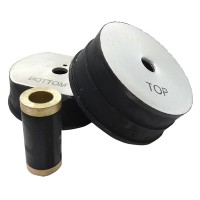THE AVIATION SUPERSTORE FOR ALL YOUR AIRCRAFT & PILOT NEEDS | +61 (1800) 953522
Aircraft Deicing Storage Tank With Transfer Pump
$5274.50/Each
Price Includes GST
Part# 12-05532
MFR Model# C100ST
MFR Model# C100ST
- JUMP TO
- Overview
- Features
- Reviews
- Q&A
- View in Catalog
Overview
Heated Insulated Storage Tanks are appropriate for indoor use only to store your de-icing fluid with a heated insulated wrap preset to 140℉. These storage tanks use an electric pump to transfer the heated fluid from the storage tank right to your Aircraft Deicing cart at a rate of up to 12 GPM. All storage tanks are supplied complete including a heavy duty polyethylene tank, 3000w 240v immersion heater, heavy vinyl insulated wrap, transfer pump, temperature gauge and a high-pressure hose with a pistol-grip nozzle.
|
Features
- Store de-icing fluid at a preset temp of 140℉ with a 3000w immersion heater
- Easily transfer hot fluid to de-icing cart using an electric heavy duty transfer pump
- 100 gallon Heavy duty polyethylene tank
- 12ft high pressure transfer hose with handgun
- Self-priming anti-siphon pump
- Meter has a large, easy to read register
- 90 day warranty
Q&A
Please note, Aircraft Spruce Australia's personnel are not certified aircraft mechanics and can only provide general support and ideas, which should not be relied upon or implemented in lieu of consulting an A&P or other qualified technician. Aircraft Spruce Australia assumes no responsibility or liability for any issue or problem which may arise from any repair, modification or other work done from this knowledge base. Any product eligibility information provided here is based on general application guides and we recommend always referring to your specific aircraft parts manual, the parts manufacturer or consulting with a qualified mechanic.

 Aircraft Spruce Australia
Aircraft Spruce Australia
























